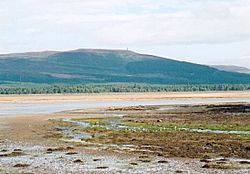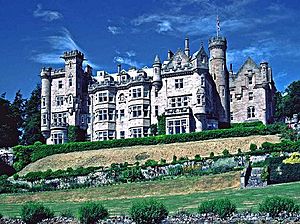Battle of Skibo and Strathfleet facts for kids
Quick facts for kids Battle of Skibo and Strathfleet |
|||||||
|---|---|---|---|---|---|---|---|
| Part of the Scottish clan wars | |||||||
 Sands of Loch Fleet looking towards Strathfleet. |
|||||||
|
|||||||
| Belligerents | |||||||
| Clan Sutherland | Clan Donald and allies |
||||||
| Commanders and leaders | |||||||
| Robert Sutherland Neil Murray |
John of Islay | ||||||
| Strength | |||||||
| 500-600 | Unknown | ||||||
| Casualties and losses | |||||||
| >50 killed | Unknown | ||||||
The Battle of Skibo and Strathfleet was a series of important fights that happened around the town of Dornoch in northern Scotland. This conflict took place around the year 1455. It was caused by an invasion from Clan Donald, a powerful group from the west of Scotland.
The local clans, Clan Sutherland and the Murrays of Aberscross, bravely defended their land. They successfully pushed back two attacks from the invaders. These battles were a significant part of the many conflicts between different Scottish clans during that time.
Why the Battle Happened
The main reason for the Battle of Skibo and Strathfleet goes back to a secret agreement made in 1455. John MacDonald of Islay, who was the leader of Clan Donald, made a deal with Edward IV of England. In this secret treaty, John MacDonald agreed to become a loyal supporter of the English king. In return, the English king promised to help him take control of northern Scotland.
However, the King of Scotland, James III of Scotland, found out about this secret deal in 1476. He was very unhappy about it. As a result, King James III took away all of John MacDonald's lands on the Scottish mainland.
John MacDonald spent the next few years trying to get his lands back. He believed they were rightfully his. He gathered many of his fighters. While many of his forces went to help a relative attack the west coast, John MacDonald himself led about 500 to 600 men. They traveled around the north of Scotland to reach the Dornoch Firth on the east coast. It's not completely clear what he planned to do, but his forces landed just a few miles from Dunrobin Castle. This castle was the home of Clan Sutherland, who controlled much of the far north of Scotland.
The Fights at Skibo and Strathfleet
When John MacDonald's forces first arrived, they set up camp in front of Skibo Castle. This castle belonged to the Bishop of Caithness. John Sutherland, 7th Earl of Sutherland, the leader of Clan Sutherland, sent a group of his men to watch the invaders. This group was led by Neill Murray.
John MacDonald's men began to cause trouble in the countryside. So, Neill Murray decided to attack them. Murray's forces successfully drove off the invaders. Clan Donald lost a captain named Donald Dubh-na-Soirn and about 50 other men in this first fight.
After this defeat, John MacDonald sent some of his men and a group from Ross further up the coast. They went to Loch Fleet, which is just south of Dunrobin Castle. In response, the Earl of Sutherland sent his brother, Robert Sutherland, with more men to meet the attackers. They met "on the sands of Strathfleet."
The fight at Strathfleet was very intense and bloody. In the end, the invading men from the islands and their allies were defeated. Many of them were killed. The survivors were chased all the way to Bonar.
What Happened Next
The Battle of Skibo and Strathfleet turned out to be the last major conflict between Clan Donald and Clan Sutherland. Soon after these battles, Robert Sutherland, the Earl's brother, married Margaret, who was John MacDonald's sister. This marriage helped to create a strong alliance between the two clans.
However, this heavy defeat for John MacDonald might have played a part in later problems he had with his own son, Angus Og. This family conflict eventually led to another big battle called the Battle of Bloody Bay, which happened around 1480 or 1483.
 | Mary Eliza Mahoney |
 | Susie King Taylor |
 | Ida Gray |
 | Eliza Ann Grier |


